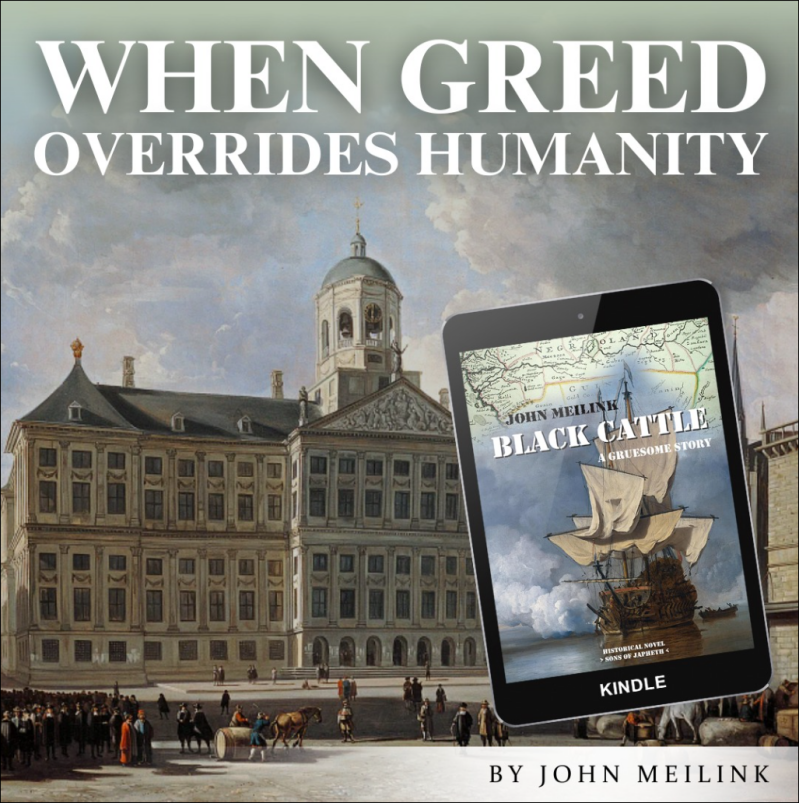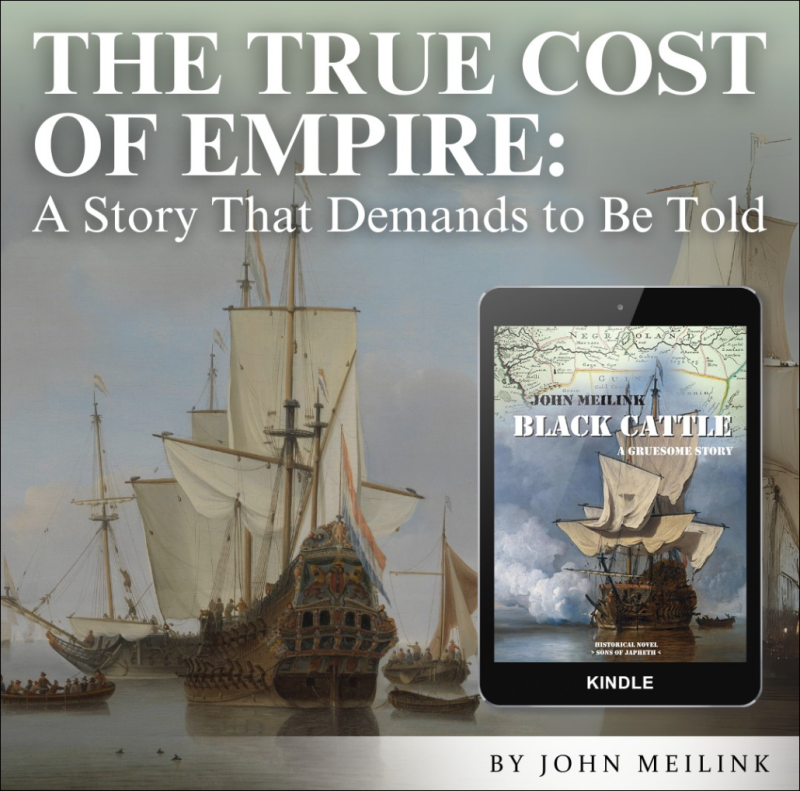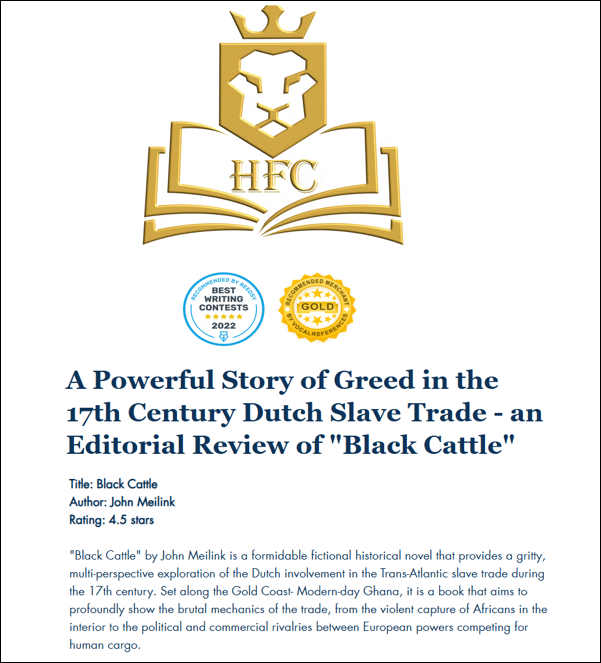Black Cattle:
A dark, immersive journey through the brutal machinery of the Dutch and English slave trade.
By John Meilink
Black Cattle is the first of four standalone historical novels (Sons of Japheth) about the Dutch and the slave trade in the 17th century.
Black Cattle is a gripping tale that transports readers to the tumultuous 17th-century world of Dutch colonial expansion and the transatlantic slave trade. Set against the vivid backdrop of the West African coast, the story intertwines the lives of sailors, merchants, and the enslaved with the political intrigue of powerful indigenous kingdoms.
The narrative follows the Dutch slave ship Griffin as it embarks on a perilous voyage through treacherous waters and morally fraught territory. As alliances shift and tensions rise, the characters grapple with survival, ambition, and the devastating realities of the slave trade. The story captures the intricate politics of the African kingdoms and their uneasy entanglements with European traders, shedding light on the complexities of resistance, collaboration, and exploitation.
Rich in maritime detail and historical authenticity, Black Cattle delves into themes of morality, resilience, and the human cost of empire. Perfect for fans of Bernard Cornwell, Patrick O'Brian or Hilary Mantel, this thought-provoking novel offers an unflinching look at a dark chapter in history, exploring its far-reaching echoes through compelling storytelling.
Black Cattle (original Dutch title: Kroesvee) was published in the Netherlands by LM Publishers in 2019 and has since been reprinted three times. The novel is included in the literature list of the new historical Canon of the Netherlands (June 2020), in the section 'VOC and WIC.'
Get your eBook, paperback or hardcover edition copy on Amazon, Ebay, Waterstones, KOBO, Books a Million, Barnes & Noble, Everand, or any other book distributor site worldwide.
"This debut novel arrives at a moment when societies worldwide are reexamining colonial histories and the enduring consequences of slavery. With its literary craft and moral urgency, Black Cattle stands as a timely and essential contribution to this global conversation."
Below you will find a series of short, atmospheric videos on the novel. To be continued!
The original Dutch title of this book is Kroesvee (as a designation for a cargo of black slaves), a term that links curly black hair with livestock and is (in Dutch) even more derogatory than the English translation Black Cattle. The term appears in the cargo lists of the Middelburgsche Commercie Compagnie from Zeeland (1720-1888), a later competitor of the West India Company.
The printed version of Black Cattle contains more than 60 beautiful black and white illustrations.

"In a world where human lives were currency, morality was a luxury few could afford. Black Cattle plunges into the ruthless ambitions of the Dutch and English as they fought for dominance over the transatlantic slave trade. This is a tale of power, brutality, and survival, where every choice carries weight, and every action leaves scars."

"Empires are not built on gold alone—they are built on suffering. Black Cattle sheds light on the colonial greed that fueled the transatlantic slave trade, exposing the depths of human exploitation. Through vivid storytelling and immersive historical detail, this novel does not just tell a story—it demands that we confront the past. Some books entertain, others educate."
American acclaim for Black Cattle:
"Black Cattle by John Meilink is a formidable fictional historical novel that provides a gritty, multi-perspective exploration of the Dutch involvement in the Trans-Atlantic slave trade during the 17th century. (...)
"Black Cattle is for serious historical fiction readers seeking to be immersed in a dark chapter of history and emerge with a more profound understanding of the human capacity for cruelty and survival. It is one of the reads out there offering a devastatingly powerful literary experience that is as educational as it is emotionally resonant."
From: The Historical Fiction Company
"Black Cattle is definitely one of the most moving and impactful books I have ever read about the slave trade and its participants. (...) This is one of those books that you finish and immediately want to start reading again. I absolutely loved this book and highly recommend it."
Grant Leishman (Readers' Favorite)
"Don't expect a story of good versus evil. This is a novel about the cold, brutal pursuit of wealth and power. (...) Black Cattle is a must-read for fans of historical novels."
Gabriel Santos (Readers' Favorite)
"The writing is crisp, engaging, and filled with well-crafted dialogue that brings the story to life. The characters are well-developed, and the reader will also appreciate the excellent narration, which adds to the overall beauty of the work."
Frank Mutuma (Readers' Favorite)
"Black Cattle is nothing short of an extraordinary exploration of a dark and complex chapter in history. The meticulous detail and vivid storytelling bring the 17th-century transatlantic slave trade to life in a way that is both haunting and enlightening.
This is a bold, unflinching book that will challenge readers to reflect on history and its lasting impact. It’s a story that lingers long after the final page."
From : Author Book Publishers
"What I admired most was how vividly Meilink paints the atmosphere. The writing feels authentic and meticulously researched, immersing you in the time period. The characters are complex, caught in situations where morality often collides with necessity, and that tension gives the story a sharp emotional edge."
From: GoodReads
Dutch acclaim for Black Cattle:
"In this historical novel, the author succeeds in crafting a fantastic story through an enviable storytelling style, enticing cliffhangers, and exciting flashbacks."
"Grim, unflinching."
"Noteworthy, because it offers a new perspective on the much-discussed (and also much-suppressed) history of the West India Company and their slave trade practices."
"Meilink proves to be a thorough researcher who has examined and carefully presented a wide range of source material. This unique perspective on the slave trade has become very engaging."
"What a page-turner! And on a heavy subject like slavery. Meilink has managed to give everyone a face—the slave traders, the intermediaries, the slaves themselves. Incredibly well-written."
"It is so vividly written that you feel as if you can see the places right before your eyes. (...) A very moving and shocking story that everyone should read."
"A beautiful work in which Meilink brings his characters to life and provides the reader with insight into the horrific past of slavery."
"The atmosphere of Black Cattle is constantly intense. You feel the tensions of the characters and the era. It holds your attention, and it's hard to put the book down. Even after you've finished it, you continue to think about it for a long time."
"Black Cattle is not just a book for history enthusiasts, but for anyone who loves a well-written story with interesting characters and an engaging plot. The book offers a unique look at an important piece of history and makes the reader reflect on the complexity of human relationships and the consequences of greed and power. In short, a book you shouldn't miss!"
The story of Black Cattle is based on extensive research and a large amount of historical sources. You can find a full list here.
Share your thoughts and opinions at info@blackcattle.net.







